[Editor’s note: On March 12, 2014 the Canadian flag was lowered in Kabul, marking the end of the longest-running combat mission in Canadian history. More than 40,000 men and women served, 158 died. The number injured depends on how you define the term. This three-part series finishing today profiles three veterans seeking, in their own ways, healing from war's invisible wounds.]
Sometimes things go blurry, hazy. Sometimes retrieving memories is like trying to see through a sand storm. Other times they surge back in sharp detail -- so focused it's as if time froze.
Master Cpl. Bryon Crowhurst's journal sits next to his bed. He wrote in it every day of his seven-month tour in Afghanistan. Many pages are as sparse and dry as that country's landscape. Some pages say, "Did nothing at all." Every once in a while, a whiff of emotion. Bryon doesn't need a detailed account of what he was feeling then. He can remember.
The simple entries in Bryon's journal serve as an index to raw memories.
"When I look through and I read what I did that day, I can remember how I was feeling or what kind of experience I was having," he says. "It was easier for me to write that way."
Wrapped around his wrist he wears another prompt to remember. A shining silver bracelet. It is a tribute to a fallen friend. Bryon's journal and his bracelet serve as reminders that what has passed is never in the past.
A prayer remembered
I grew up with Bryon. We were both six when he asked me to marry him. We stood in the green field just out of range of the football posts. He plucked a bright yellow dandelion out of the grass, ever the gentleman, and asked, in a matter-of-fact way, "Will you marry me?" I accepted. It was long ago, but we both remember it. We still joke about that day.
As children we spent our free moments tearing across our school playground, dangling from the rusted monkey bars. There weren't many others in our tiny universe, a rural county in southern Ontario. Back then the world seemed small. Time was infinite.
We spent our afternoons at the Boston Baptist Church, a red brick building at the centre of town. Bryon was a proud member of Boys Club, and I, Pioneer Girls. In the summers it was Vacation Bible School. While I stopped going as I grew older, Bryon continued. Neither of us was particularly religious. Most of the kids attending weren't. But we loved going because it was a chance to be with our friends.
As we grew up Bryon and I remained close. In high school he was a skinny guy, athletic and friendly, not interested in school, but thoughtful and hard working.
Bryon wonders if it was this childhood he was reaching for the night Petty Officer Craig* was killed by an improvised explosive device. Bryon hadn't met Craig before that day. They weren't in the same battle group. They had different friends and different experiences. Bryon didn't know what town Craig was from. He didn't know where Craig trained or who his best friend was. It didn't matter. That day is permanent in Bryon's mind. That day he wrote this in his journal:
May 3, 2010,
Day 197,
Rest in peace brothers.
Our father who art in heaven, hallowed be thy name. Thy will be done on earth as it is in heaven. Give us our day our daily bread. And forgive us our trespassers as we forgive those who trespass against us. And lead us not into temptation, but deliver us from evil. For thine is the kingdom the power and the glory forever and ever.
Amen.
Bryon can't remember when or how he learned that Bible verse. But in the aftermath of the blast, it seemed the right thing to write. "It's something you'd usually say at a funeral," Bryon says. "But we didn't really..." He pauses searching for the right words. "I wasn't going to be able to be at the ramp ceremonies." Those are when fallen soldiers' caskets are formally loaded onto aircraft to be flown home.
"I wasn't able to be in Canada when they had the funerals. And it was just kind of a way for me to remember what happened. Kind of say my piece."
The journal entry was Bryon's chance to say goodbye.
On the road
The dusty earth shook with the sound of the blast. The sand swept upwards swallowing everything in its path. It was chaos, Bryon says. He couldn't tell how close or how far the explosion was. He couldn't tell who had been hit. As he spun around, the cloud engulfed one of his closest friends. "I thought he was dead," Bryon says. "The first instinct I had was to run over there and see if I could help. Like sprint over there." But he couldn't. His commander told him to remain calm and watch for additional attacks.
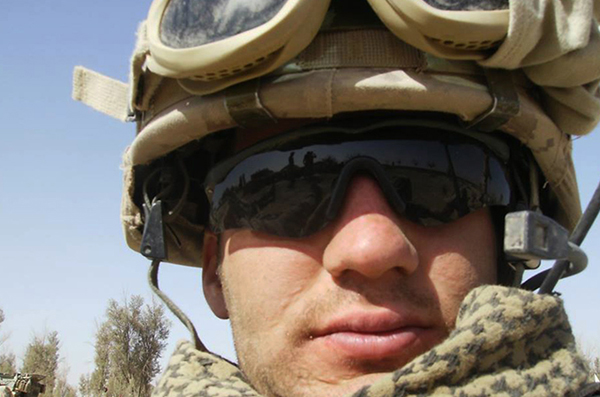
They had been hit by an IED, a roadside bomb built to deliver maximum impact and causalities. Bryon says he thinks this one was command-wired. A command-wired IED has wires running from the bomb to a battery. This means somebody was watching, waiting, deciding when to detonate. Deciding who would live and who would die.
Bryon's first thought was not about himself. He wanted to help the others. Which meant his instinct was fighting his military training that told him he had to wait. There was a possibility of a counter attack. "Usually they have more than one IED," Bryon says. "They'll wait for a whole bunch of guys to run in there and help their buddy that just got hurt. And then blow up the other ones."
So they watched and they waited.
As the cloud of dust scattered it revealed the damage. Bryon's group had been just out of reach of the blast. His friends were uninjured. "I hate to admit it," Bryon says, "but I felt relieved. There were guys that were injured, but I felt relieved that the guys in my section were okay."
Three men were hit. Two were severely wounded. Craig, who was a member of the counter IED detachment, was thrown backwards, the force of the explosion launching him into a roadside ditch.
'Abnormal events'
The first time Bryon told me about Craig, it was 2010 and he had barely been home a month. Bryon invited a couple of his close friends over. We sat around the kitchen table at his parents' Ontario home and talked. His laptop was open and his journal was on the table.
It was the first time in ages that we'd been together. Then we drifted again. Months had gone by when I reconnected, and asked if I could interview him for this story.
Today Bryon is 26 years old. He is still slender and quick to smile or joke. Looking at him now, there's not much difference between Bryon the athletic teen, and Bryon the soldier returned from war.
Bryon joined the army in 2006, the same year we graduated high school. He wanted a job where he could be active and outdoors, so one of his teachers recommended the military. He was in the reserves for two years before moving to an army base in Edmonton, Alberta. He deployed to Afghanistan in late 2009, finished his tour of duty in May of 2010, and remains in the army.
Canada, which has sent 40,000 military personnel to Afghanistan since 2001, has the third highest coalition fatality count, 158, behind the U.S. (2,292) and the U.K. (446). Soldiers returning from war, according to University of British Columbia counselling psychologist Marvin Westwood, bring the war home with them. To onlookers, and even family members, everything may seem normal. But stress-related injuries among soldiers are normal -- "a normal reaction to abnormal events," says Westwood.
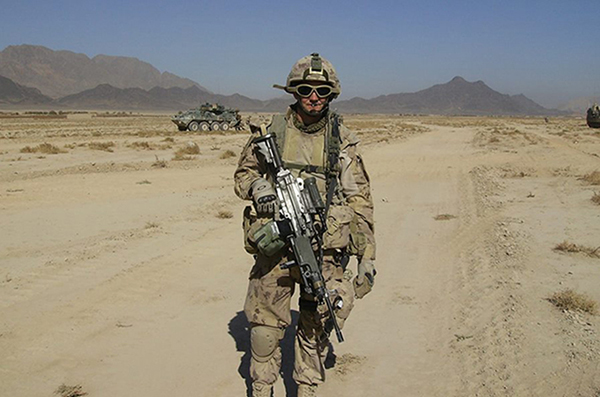
To me, the Bryon who survived war seemed okay. I ask how he is doing. He says there have been times that his senses were heightened. Where he's found himself uncomfortable with the lack of order and control. But overall he says he feels fine. "I've heard stories about other people having a lot more difficulties than myself. I didn't really find it too bad," he says.
He does recall one unnerving instance, less than a month after his tour ended. He was home in southern Ontario, about a month after the blast that had killed Craig a world away in an Afghanistan ditch.
"It was Canada Day long weekend and we're out having a bonfire in the back," Bryon says. "One of the neighbours set off fireworks and just hearing the fireworks blow up jumped me."
Bryon spun toward the blast.
'Not even close'
It had already been a long day, five or six hours in the unrelenting Afghan heat. They were battling dehydration and exhaustion as evening approached. Heading back on the main road, not far from base, the blast hit.
Bryon can't recall how much time passed before his section commander began giving orders. His order was to go into the ditch. To go to Craig, Bryon slid down the embankment with three others. "We tried to do first aid on him as quickly as we could," Bryon says. He held his head in case there was a neck or spinal injury. Craig was lying on his back, and there was a risk that he would stop breathing. So Bryon put in an NPA, a tube that is inserted through the nostril and into the throat, so Craig could breathe.
"The guys were having trouble with putting tourniquets on his legs because the back half of his legs were gone all the way up past his butt, all the way up to almost his back," Bryon says.
Tourniquets are supposed to be placed four inches above the wound, but there was no end to the wound. "We tried the best we could, and put gauze on the best we could, and got a stretcher down there to try to get him out," Bryon says. But the weight of Craig, coupled with the armour, backpack and stretcher made it difficult to carry him up the steep embankment.
"While you're there you don't feel like time's passing," Bryon says. "You think like five minutes is an hour." Or that an hour is only five minutes.
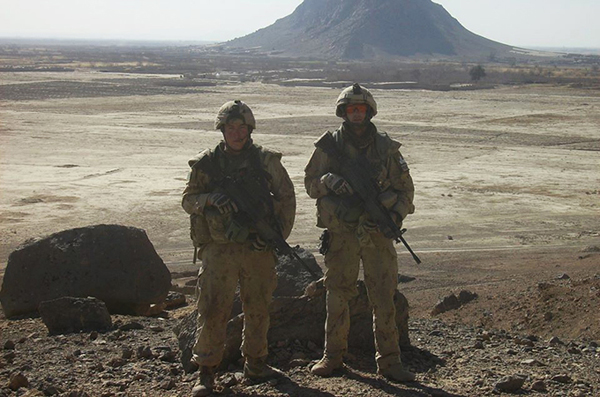
They finally got Craig out of the ditch. They gave him as many bandages as possible but nothing would staunch the flow of blood. They had also been performing CPR for what Bryon says seemed like only five minutes but was actually half an hour. Nothing worked. "I think it was around that time that we decided we needed to be able to help the guy that was still alive."
"We train for this," Bryon says. "Like you try and do as much training as you can do, but it doesn't prepare you for the real thing. Not even close."
That night, back at the base, nobody said much.
Later in the week Bryon spoke with his mother. She asked if he'd heard about a soldier who'd passed away in Afghanistan. "He's from Simcoe," she said. Simcoe was only 20 minutes from Bryon's childhood home. Bryon wasn't sure. He asked for the name. She said Petty Officer Craig*. He replied, "Yeah mom I heard about it."
A blessing, right?
I notice that Bryon has taken to wearing a bracelet on his wrist. Nothing flashy. Just a thick silver band so non-descript it had been easy for me to miss. I ask him about it and he tells me he has for some time worn the bracelet in commemoration of a dead soldier. But the soldier isn't Craig. It is Pte. Tyler*, one of Bryon's close friends. He died the morning of April 11, 2010, while on patrol just southwest of Kandahar city.
Tyler and Bryon met in Wainwright, Alberta while training at the Canadian Forces Base. They graduated from battle school together in 2008. In their spare time they rode motorcycles.
Tyler and Bryon deployed together. But once they reached Kandahar Air Field they went their separate ways. Bryon was Charlie Company and Tyler was Delta. Bryon only saw Tyler once during the entire tour. It was a chance meeting. His company had just finished securing a building when Delta Company came in to take over. That was the last time he saw Tyler alive.
Bryon can't recall his journal entry for April 11. "I haven't looked at that one for a while," he says. But he remembers the day clearly.
His section was getting an O group -- a daily meeting to receive instruction and pertinent information. Bryon was seated on his bed taking notes. They were nearing the end of the meeting when the session commander informed the group that someone had been killed by an IED. "My session commander told me that somebody was hit in Delta Company," Bryon says. "I was like, 'Oh shit.'"
Three groups from CFB Edmonton deployed together. Bryon wanted the others to hear the news from him. "My section was one of the first sections to get that O group that day. So instead of hearing it from one of the session commanders that didn't know Tyler, I went to all the other guys that knew him and told them." It was his way of doing right by his friend.
The following day Bryon was on patrol. He was sitting in a wadi -- a ditch that runs through the towns, used for water or sewage. He was relaxing in the shade. "I remember sitting in the wadi and saying, 'I guess they're doing Ty's ramp ceremony right now.' Then we had to keep walking, there was not much we could do."
Bryon wasn't able to attend Tyler's ceremony or funeral. "It would have been nice to say goodbye," he says. "But we have jobs to do, so you keep doing your job."
He's made peace with not being able to attend. "I always think about how they had it back in World War Two. They weren't able to go bury their buddies every day, and sometimes they weren't even able to recover their body," Bryon says. "So the fact that we have ramp, that we can go out and watch your brother get taken back and buried in Canadian soil, is awesome. A blessing, right? I was able to take comfort in that."
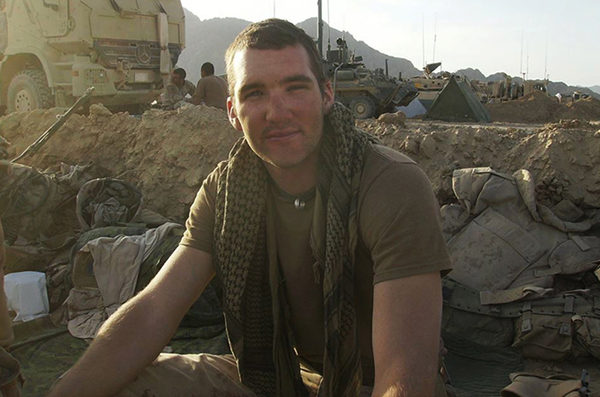
According to Marvin Westwood, soldiers need to acknowledge what they lost during the war. They need to say goodbye. "It is a grieving process, but they wouldn't claim that. They would just say 'I'm just releasing a lot of my baggage of regret and loss to my buddy.'"
I ask Bryon, again, how he is handling his memories of war. "Everybody is completely different. Other guys may take longer to readjust, but for myself I didn't really find it too hard," he says. He's not sure why it has been easier for him. It is a question he has thought about a lot. "I have no idea. It just depends on the person. Call it upbringing. Call it nature. Call it nurture. I have no idea what makes me different from other people."
On Remembrance Day every year, Bryon says, he wears his uniform proudly. He watches the ceremony, and then walks up to the cenotaph. "I always go up and I lay my poppy down on the wreath," he says. "Usually that's when it gets to me. I get pretty choked up, when I do that."
The bracelet Bryon wears bears a different date for remembrance. Inscribed is this: Tyler, Killed in Afghanistan, April 11, 2010. "I always look at it. Every day I wear it. And so it's not like one day where all the emotion comes bubbling out. It's always there. It helps me never forget."
*Author's note: In this story and the two previous, the full names of fallen soldiers have been omitted. I have chosen to only include their title and first name. This is to acknowledge their rank and their significance to the soldiers experiencing the losses, but also wishing to protect the privacy of families and friends who've lost loved ones. ![]()



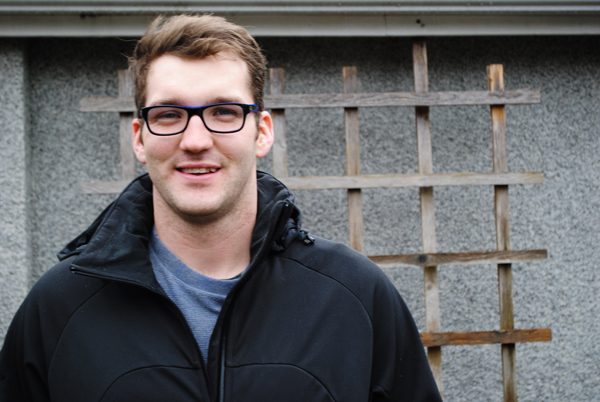












Tyee Commenting Guidelines
Comments that violate guidelines risk being deleted, and violations may result in a temporary or permanent user ban. Maintain the spirit of good conversation to stay in the discussion.
*Please note The Tyee is not a forum for spreading misinformation about COVID-19, denying its existence or minimizing its risk to public health.
Do:
Do not: